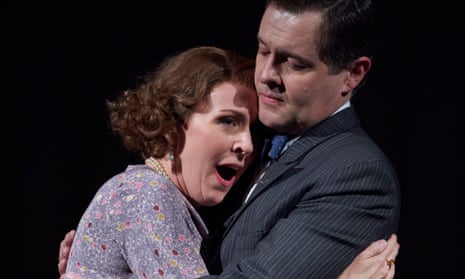Intermezzo has long been regarded as one of Strauss’s problem pieces. First performed in 1924, and openly autobiographical, it dramatises a period of strain in the composer’s publicly stormy marriage, when his wife Pauline, erroneously suspecting him of having an affair, sued for divorce.
Admiration for the score, one of his greatest, is often tempered by qualms about the subject, and in particular Strauss’s presentation of Pauline’s alter ego Christine Storch as self-dramatising and temperamental, which in turn has provoked accusations of tastelessness. Recent stagings, however, have probed the emotional ambiguities beneath the sometimes brittle surface, and Bruno Ravella’s production for Garsington Opera is among the most touching and effective to date.
Ravella is helped immeasurably by practically perfect performances from Mary Dunleavy and Mark Stone as Mr and Mrs Storch. Dunleavy’s bravado masks a deep vulnerability, to which she can only give way when alone. Stone, as Robert, is bluff, attractive and at times irritatingly complacent. We’re conscious, throughout, of the affection beneath the tantrums, so that when the crisis comes we fully understand its potential to shatter their lives.
Robert claims the threat of divorce has brought him near madness, a line some interpreters pass off as exaggeration, though Stone presents us with a man on the edge, collapsing in anguish in the pouring rain as the implications hit home. The closing scene of Act I, in which the couple’s son, Franzl (Louis Hynes) turns on his mother, blaming her for his father’s absence, is almost unbearable. Strauss called the opera “a bourgeois comedy”, but we soon realise that much of it is far from funny, though the reconciliatory ending is heart-warmingly beautiful.
There are peripheral flaws. Giles Cadle’s set shows us a cross section of the Storch’s house, its panelled walls unfolding to reveal a toboggan run, a dance hall, even the Prater in Vienna, all of which is ingenious but can be fussy. A thigh-slapping dance by men in lederhosen strikes a false note during the big, first-act waltz, and Sam Furness as Baron Lummer, the opportunist who exploits Christine’s loneliness in an attempt to fleece her of her money, is a bit too caddish too soon. The smaller roles are cast from strength – Ailish Tynan is glorious as the Storch’s knowing, put-upon maid, Anna – and there’s conducting of great immediacy and sensitivity from Jac van Steen. It’s a fine, profoundly humane achievement and well worth seeing.
- At Garsington Opera at Wormsley until 9 July. Box office: 01865-361636.

Comments (…)
Sign in or create your Guardian account to join the discussion